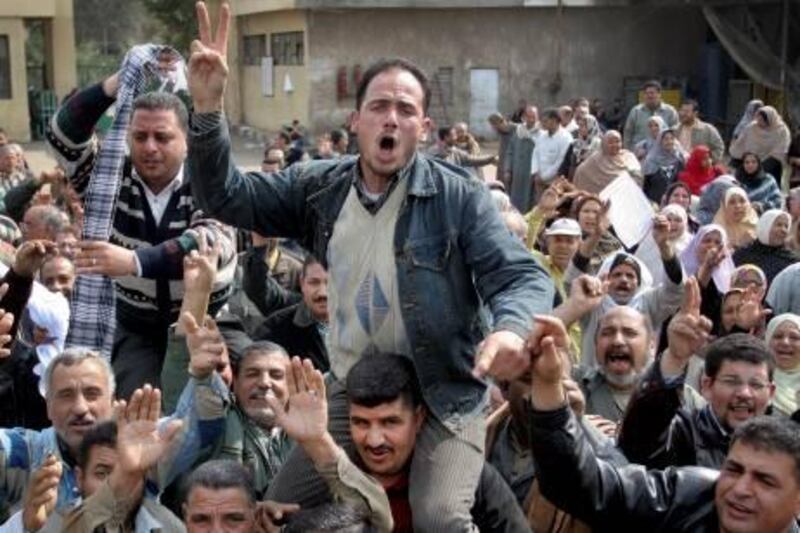CAIRO // Workers at the Suez Canal went on strike yesterday, part of a spreading wave of labour unrest that kept most of Egypt's economy shut down this week and prompted a growing public backlash.
About 1,500 workers in the Suez Canal Authority demonstrated in three cities along the canal, but promised not to interfere with the operations of the strategic waterway. They joined tens of thousands of workers, from train drivers to government ministry employees, who again stayed home yesterday to demand higher wages.
The strikes continued despite two public warnings from Egypt's new military rulers on Tuesday and Wednesday urging the strikers to return to work "at this delicate time". Altogether, this week's strikes and the 18 days of successful protests against the regime of the former president Hosni Mubarak cost Egypt's economy more than 10 billion Egyptian pounds (US$1.7bn), according to estimates released yesterday by the official government statistics agency.
The sum included losses in the tourism, manufacturing and construction sectors, according to the report, published by Mena, the state news agency.
The continued strikes prompted Al Destour, the independent Egyptian newspaper known for its frequent criticism of the government, to call for an end to protests in a front-page headline.
Hisham Ezz al Arab, the chairman and managing director of Egypt's largest private financial institution, Commercial International Bank, said continued strikes had the potential to "hijack" the youth-led revolt that began on January 25 and led to Mr Mubarak's resignation.
"If the strikes keep spreading, people don't understand they are going to spoil the 25th of January because they are selfish," he said in an interview. "You cannot run your business when every day they have strikes."
The strikes amounted to opportunist efforts to get as much out of employers as possible in the wake of the uprising, Mr al Arab said.
"There are no specific demands," he said. "Everyone has a personal demand."
Strikers have different priorities but have coalesced around a central demand that the government raise the minimum wage to 1,200 pounds a month.
The rate has remained fixed at only 35 pounds per month since 1984.
Some strikes have had some effect in the past week. The central bank said it would sit down with tens of thousands of workers from bank branches, while Egyptian railways has promised permanent contracts to several thousand workers. Arafa Holding, a major private textile company, announced yesterday that it had reached "satisfactory agreement" with striking workers and would resume operations next Sunday.
The Supreme Council of the Armed Forces has urged labour activists to table their demands and strikes until a civilian government re-takes control of the county after an election in six months. The council has named a committee to study amendments to the constitution that it says would be required for the country to host a free and fair election.
The council's top-down approach in naming the members of the committee drew criticism yesterday from Mohammed ElBaradei, the pro-democracy activist who played an important role in the protests against Mr Mubarak's regime.
Six months under the domination of the military "threatens to throw the country back in the arms of the forces of the old regime," he said in a statement. "To prolong the transitional period without popular participation threatens to throw it back in the arms of dictatorship."
Mr el Baradei suggested that the military rule jointly with civilian representatives through a temporary presidential council.
"The presidential council should represent the national forces as well as the military and create the democratic and institutional framework to give people time to prepare during the transitional phase, without rush," he said.
* Additional reporting by Bradley Hope





